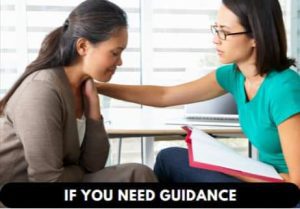The question Should you have any questions is familiar to teachers, guides and those who have been opportune to instruct people on a particular subject.
It is a phrase and makes more sense when it is completed like this, “Thank you for being a part of this, should you have any questions, feel free to approach me and ask”
This means that the phrase lets the other person(s) you are speaking to know that it is okay to come to you for answers and clarification if the need for that ever arises.
In this article, we will have listed fifteen (15) other ways you can say “Should you have any questions”. It applies to all situations both formal and informal, so feel free to pick any from below as it suits your situation.
15 Other Ways to Say, “Should You Have Any Questions”
If you need guidance

The phrase If you need guidance is just as suitable as Should you have any questions when using it to address people. When a person comes to you with questions, it obviously means that they need guidance.
The statement shows that the person you are talking to has lesser knowledge concerning the topic being talked about and if he/she is to be successful, he/she will need guidance from you.
A person can also offer guidance when he/she is responsible for giving people direction. For instance, a security guard can offer guidance to people who are visiting the building for the first time.
If you ever need clarification
This is another way to say Should you have any questions by using the statement If you ever need clarification. When a person needs clarification, he or she needs something to be made clearer and easier to understand.
Most times when a person seeks clarity, he or she comes with questions that require answers from you. Where you are in a position to impart knowledge to them, you could encourage the people you are teaching to approach you for clarification whenever they need to.
If you have done due diligence on the topic you’re handling, then you can just say If you ever need clarification to be cordial. This means that you expect your students to have understood perfectly but just want to leave open the chance to ask questions.
In case you need further assistance
If you need a good replacement for the phrase Should you have any questions then you can use the statement In case you need further assistance.
When you are in a position to offer help or support, you may want the people who need your help to know that you are available and willing to help them.
Most people use this phrase when they are in a professional setting, or they just want to be formal. It could also be attached to emails, formal letters, and/or customer service statements.
If you require further information
For a person to use this phrase If you require further information, it means that they have enough knowledge about a particular matter and are in a position to disperse that knowledge to people.
People in this position include customer service representatives, receptionists, and other service providers who are responsible for giving information to customers.
This phrase can be used in several ways which include – If you require further information, feel free to reach out to me or If you ever need more information, do give us a call or send a message and you will receive a response speedily.
Should you need help in any way
Another good phrase to use in place of Should you have any questions include Should you need help in any way. A person can only use the latter phrase when they are in a position to help others.
The help could come in different ways such as a piece of advice, information, a listening ear, a lending hand, a guide, an action, etc. If a person wants to help, they must have the skill, knowledge, or finances necessary to offer such help.
The person who you may be saying this could be a family member, friend, spouse, or anyone who you are willing to do anything for. It could also be a stranger who has asked for your help.
Feel free to ask your questions
Using the phrase Feel free to ask your questions is another to tell a person Should you have any questions. They mean the same thing and communicate the same idea.
When you ask a person to Feel free to ask your questions, you want them to be comfortable with bringing their confusion to you for clarity and their questions for answers.
The class of people that mostly use this phrase are lecturers, coaches, teachers, or anyone who is in a position to enlighten others by empowering them with knowledge.
In case of any query, contact me.
Another way to say Should you have any questions is by using the phrase In case of any query, contact me. For a person to comfortably bring their questions or their problems to you, you have to be available to handle them for them.
If you are not physically present to handle any query, then you can leave a way for them to contact you if need be. When you’ve left an email or number, you can now tell them to contact you for any queries.
Asking someone to contact you when they want to query you simply means that you are asking them to reach out to you when they want to ask questions to get more information or clear their doubts about something.
For further enquiries, endeavor to reach out.
Another way a person can say Should you have any questions is by using the phrase For further enquiries, endeavor to reach out. It is mostly used at the end of an email or a formal letter.
From the statement, it can be deduced that the person who is been addressed had previously made an enquiry which has been addressed.
However, the speaker is assuring the person that if perhaps he/she should have more enquiries, he/she only needs to reach out for it to be handled.
People who use this statement want to encourage others to try their very best to reach out if they have questions or need to get information about something.
Should you have any need to quiz me
Another phrase that can be used in place of Should you have any questions is Should you have any need to quiz me? Though different wordings are used, they mean the same thing.
When you give someone leave to quiz you, it means that they can ask you as many questions as they wish to, and you will answer them. A person who quizzes another is fishing for information.
The phrase Should you have any need to quiz me does not necessarily mean something rude as most people would perceive it. It just means that the person is allowed to ask as many questions as he/she deems necessary, and it won’t be seen as a disturbance.
Perhaps if you have any concerns
If you are searching for another way to say Should you have any questions, you can use the statement Perhaps if you have any concerns. This latter phrase is used to assuage a person who may have worries about something.
The phrase can however be valid only where the person speaking has what it takes to resolve the other person’s fear or worries. It gives the person being spoken to the confidence that his/her concerns will be resolved once it is brought to you.
Having concerns about various things includes someone talking about something that affects, interests or worries him/her. The person is to share the concerns and have it handled on his/her behalf.
If you wish to share your thoughts

A person who is seeking another creative way to say Should you have any questions can use the phrase If you wish to share your thoughts. In this case, you are giving the person leave to share their thoughts with you.
The thoughts can come as a question, and it can equally come as a suggestion. If thoughts the person shares with you show that he/she is still confused, you can use that as an opportunity to clarify him/her.
Sharing a person’s thoughts can also include giving a piece of advice or opinion about a certain matter.
Should you require more information
The statement Should you require more information is another method a person can adopt when they want to say Should you have any questions. It means that you have probably given them a certain amount of information and you are open to giving more.
It may be your job to disperse information to people who need them. However, when you have to disperse information to a large number of people at a time, you may not tell everyone what they need to hear.
To be able to make up for that, you can encourage them to contact you or your team if they need to give or receive more information. To do that you can say Should you require more information from us, feel free to contact us.
Questions or suggestions?

The simple question Questions or suggestions? can act as a suitable replacement for the statement Should you have any questions. It is asked when someone has finished teaching a lesson and wants to make sure that everyone understands the lesson.
The instructor will just ask Questions or suggestions? This leaves the floor open to individuals who wish to ask questions or give their opinions about what is being discussed.
Do you want to know more about this?
When you ask someone whether they want to know more about a thing, it means that you are willing and able to give them as much information as they want about that thing.
It is mostly used by marketers when they are introducing a new product to the market. They will write an engaging sales copy that explains their products and their importance.
When they believe that they have captured the attention of their audience, they will then ask you if you would like to know more about the product. Answering in affirmation will then allow them to attempt to sell their products to you.
Do you need me to cover anything else?
After you have explained something to someone, what would be the most likely thing to say? It would be the phrase Do you need me to cover anything else? which is quite similar to the statement Should you have any questions.
The phrase also explains situations where a person is acting as a guide and is responsible for dispersing valuable information that will help people find their way.
When you are done giving the person a suitable explanation, you can ask them if they wish you to cover any other area that may be confusing to them. This phrase also applies to tutors.
To end with,
Now that we have listed fifteen (15) other ways to say Should you have any questions…? ensure to use as many of them as you wish while you go on with your daily duties.
It makes your use of English creative and more professional. If you work as an instructor or guide, then you will need the above-listed phrases to build a better connection with your students.